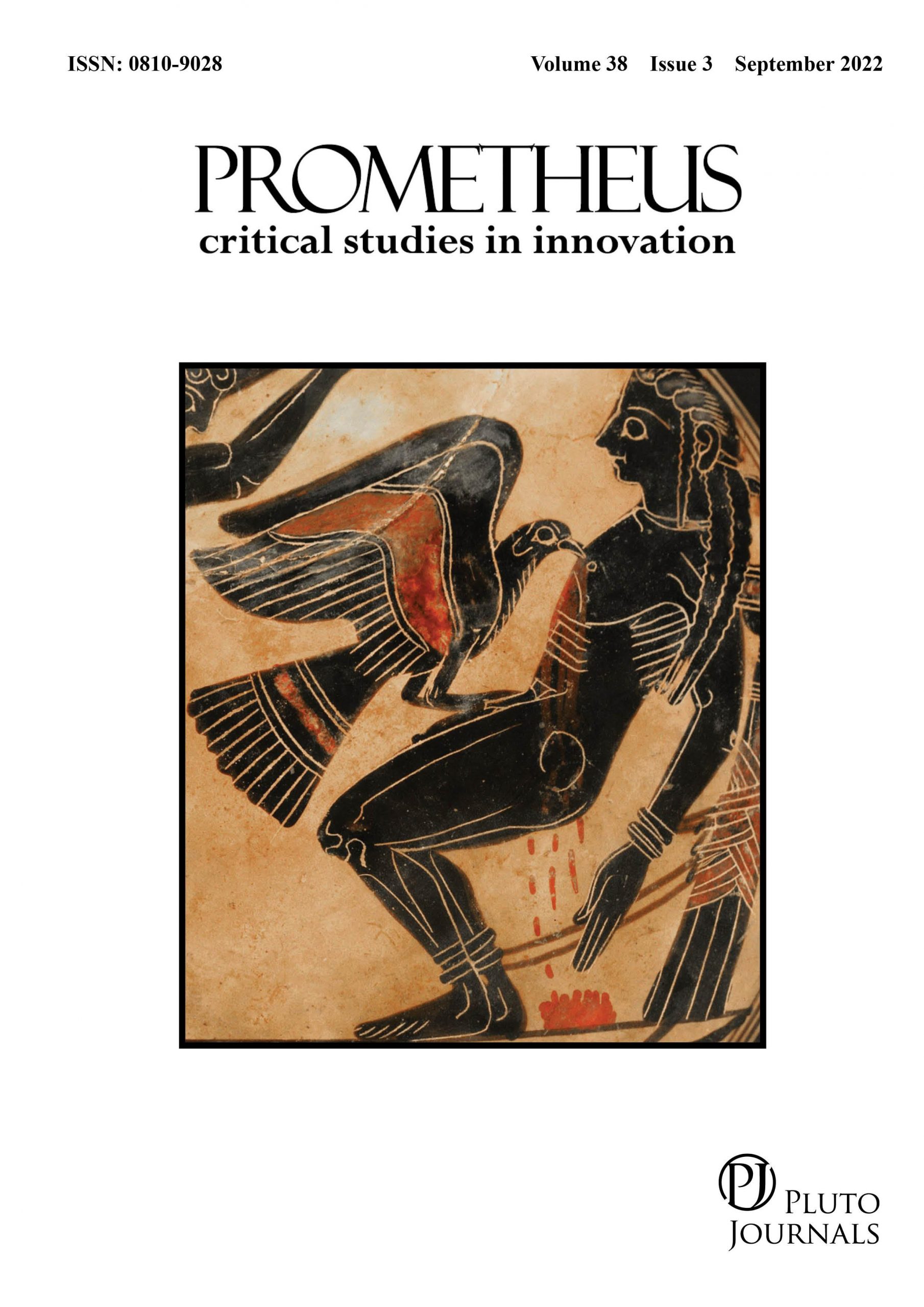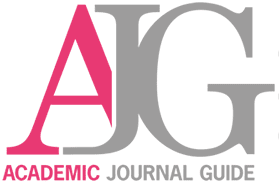
Prometheus
Prometheus publishes critical papers, those that express – and justify – opinions on innovation issues. We are particularly attracted to papers that challenge prevailing views. We encourage debate. Prometheus aims to publish papers that are not so technical or specialised that they cannot be appreciated by a wide readership that includes academics, practitioners, and policymakers.
Print ISSN: 0810-9028
Online ISSN: 1470-1030
Zeus, the most powerful of the Greek gods, was enraged when Prometheus revealed to mankind the secret of making fire. The punishment of Prometheus the titan was to be chained to a rock where an eagle would devour his liver by day. By night, his liver would regenerate in preparation for the following day’s pecking.
Nor does Prometheus the journal expect much thanks for spreading knowledge about innovation. Since its launch in 1983, Prometheus has pushed against the boundaries surrounding the understanding of innovation, in its broadest sense. It has met some resistance. Prometheus is no stranger to controversy, nor to the consequences of defying convention.
From a core interest in technological change and the information required to bring it about, the journal’s scope has expanded to cover:
- The history of innovation
- Information for innovation
- Invention and creativity
- Research and development
- Diffusion of innovation
- Science and technology policy
- Organisational strategy for innovation
- Intellectual property rights
GENERAL EDITOR
Stuart Macdonald (s.macdonald@sheffield.ac.uk)
Leicester University, UK
EDITORS
Peter Drahos
Research School of Pacific and Asian Studies, Australian National University, Australia (peter.drahos@anu.edu.au)
Areas of expertise: patents, intellectual property, trade, regulatory and governance theory.
Hans-Jürgen Engelbrecht
Department of Economics and Finance, Massey University, New Zealand (H.Engelbrecht@massey.ac.nz)
Areas of expertise: information/knowledge-based economy/policy/society, economic growth and knowledge spillovers, the role of human
capital, happiness economics, behavioural economics related to the information/knowledge-based economy
Richard Hawkins
Science, Technology and Society Program, University of Calgary, Canada (rhawkins@ucalgary.ca)
Areas of expertise: research policy, innovation theory and policy, university-industry collaboration, intellectual property, standards, technical regulation, electronic media industries
Steven Henderson
Southampton Solent University, UK (profsteven.henderson@gmail.com)
Areas of expertise: strategic management, organisational learning, critical thinking
Richard Joseph
130 Orange Valley Road, Kalamunda, WA, Australia (rajoseph4342@hotmail.com)
Areas of expertise: science and technology policy, Australian government policy, academic freedom and managerialism
Karmo Kroos
Department of Economics, Estonian Business School, Estonia (karmo.kroos@ebs.ee)
Areas of expertise: theories of social change, elites as agents of social change, the role of the university, higher education policy, sociology of knowledge, Central and Eastern Europe
Robin Mansell
Department of Media and Communications, London School of Economics and Political Science, UK (r.e.mansell@lse.ac.uk)
Areas of expertise: internet governance, telecommunications policy and regulation, social impact of new media, political economy of media and communication, development and ICTs
Martin Meyer
Business School, University of Aberdeen, Scotland (martinstmeyer@icloud.com)
Areas of expertise: science and technology indicators, university-industry technology transfer, third mission, triple helix, intellectual property management, science-based innovation, new technologies (especially nanotechnology), technological systems, sectoral systems of innovation, programme evaluation
Joanne Roberts
Winchester School of Art, University of Southampton, Winchester, UK (J.Roberts@soton.ac.uk)
Areas of expertise: knowledge economy, knowledge creation and transfer communities of practice, business services, internationalisation of services, information and communication technologies innovation systems
Kevin Scally
Cork University School of Business (CUBS), University College Cork, Ireland (k.scally@ucc.ie)
Areas of expertise: invention and design; USPTO patents and innovation; IP and nonprofits; software usability; creativity, iconoclasm and play
Peter Senker
University of Sussex, Brighton, UK (peter.senker@ntlworld.com)
Areas of expertise: technology, inequality, wealth and poverty; technology and the environment, capitalism and neoliberalism
Uta Wehn
IHE Delft Institute for Water Education in partnership with UNESCO, Delft, The Netherlands (u.wehn@un-ihe.org)
Areas of expertise: knowledge, ICTs and innovation for development; inter-organisational data and knowledge sharing; knowledge management; capacity development; innovation systems; water innovation studies; citizen science
BOOK REVIEW EDITOR
Steven Umbrello
Managing director, Institute for Ethics and Emerging Technologies, Boston MA (stevenumbrello@yahoo.com)
Please see the submission guidelines here.
Papers should be submitted direct to the general editor at s.macdonald@sheffield.ac.uk.
Journal’s General Editor, Stuart Macdonald, s.macdonald@sheffield.ac.uk
Publisher Pluto Journals, evek@plutojournals.com
The journal is published quarterly in March, June, September and December. The electronic journal is archived in Portico. The journal is indexed by Scopus, and the Emerging Sources Citation Index. The journal has been indexed on DOAJ since March 2023.
The journal is Open Access and the Open Access statement, Open Access license terms, copyright terms as well as a statement on its absolute lack of author charges can be found here.
The journal became Open Access on 1 January 2021 and is published open access on ScienceOpen. All journal material published from 1 March 2014 is also published, Open Access on ScienceOpen meaning the reuse rights of this published material is also under the open CC BY 4.0 license as stated here. Material published prior to 2014 is available through making a download payment of your chosen denomination on the Prometheus website here.
Publishing ethics Prometheus adheres to the ethical standards endorsed by the Committee on Publication Ethics (https://publicationethics.org/). Be clear that the editors of Prometheus take infringement of these guidelines seriously. Where authors’ explanation for their behaviour is unsatisfactory, our practice is to:
- reject the authors’ submission
- inform interested authors and publishers of the circumstances
- inform organisations to which authors claim affiliation of our findings




